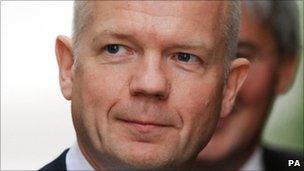The changing shape of UK foreign policy
- Published

Mr Hague says the UK's security is affected if human rights abuses go unchecked
Despite a series of speeches by UK Foreign Secretary William Hague - the latest putting the emphasis on human rights - it is difficult to know where British foreign policy is going.
Mr Hague talks about a "distinctly British" foreign policy. At times it sounds like an all-things-to-all-people package. There's lots of talk about reaching out and networking.
The policy is neither strongly pro- nor anti-American. This matches the current mood in the Obama administration, which is neither strongly pro- or anti-British, or European.
Britain is quietly moving away from the United States. Even before he became foreign secretary, Mr Hague was criticising the abuses that emerged from the "war on terrorism". Britain is still fighting in Afghanistan but wants out before the next British election.
This also matches the Obama mood, which is drifting away from Europe (and also wants out of Afghanistan). Washington seems to favour policies that are parallel with those of its allies but not so integrated as some of them were under George Bush and Tony Blair.
This will be put to the test if and when a decision looms about whether to take military action against Iran.
Human rights
But nor is Britain that interested in Europe. It is not pro-EU but nor is it particularly anti-EU. Indeed, the foreign policy side of the EU works well for Britain, because it is based on consensus.
British policy appears to recognise that power in the modern world is increasingly being defined by economics. So the Foreign Office wants its diplomats to push for British "prosperity".
It also wants them to monitor human rights abuses more closely. This is very different from the rhetoric about a "generational clash" with militant Islam that Tony Blair believes is going on.
Yet sometimes human rights and prosperity will clash. Contracts for arms, which Britain makes a lot of, often raise questions about the actions of the government buying them. Which will win in these cases - prosperity or human rights?
Mr Hague is setting up a special human rights advisory group on which aid agencies will have seats. The Foreign Office already gives an attentive ear to these agencies and this move represents a step up for them.
It seems to be another manifestation of the "distinctly British" approach. An EU-wide policy on the reporting of human rights might be more influential.
Growing economies
The new policy is supposed to reach out to the growing economies - India, Brazil among them. But everyone does that and previous British governments have done it.
Russia is also supposed to become a new friend. Hopefully, Russia too now wants to be more friendly to the West. It will be interesting to see if Britain criticises Russia's human rights record. Or will the new prosperity imperative prevail over such concerns? It seems to have done so already over the unresolved Litivinenko affair, which has been put to one side.
Great uncertainty prevails as to how all this will feed into the British strategic defence review now under way.
Does it represent a distancing of British policy from interventionism? Will the UK still seek to play a world policeman role and how will its diminished prosperity pay for it if it does?
Paul.Reynolds-INTERNET@bbc.co.uk
- Published8 September 2010
- Published14 July 2010